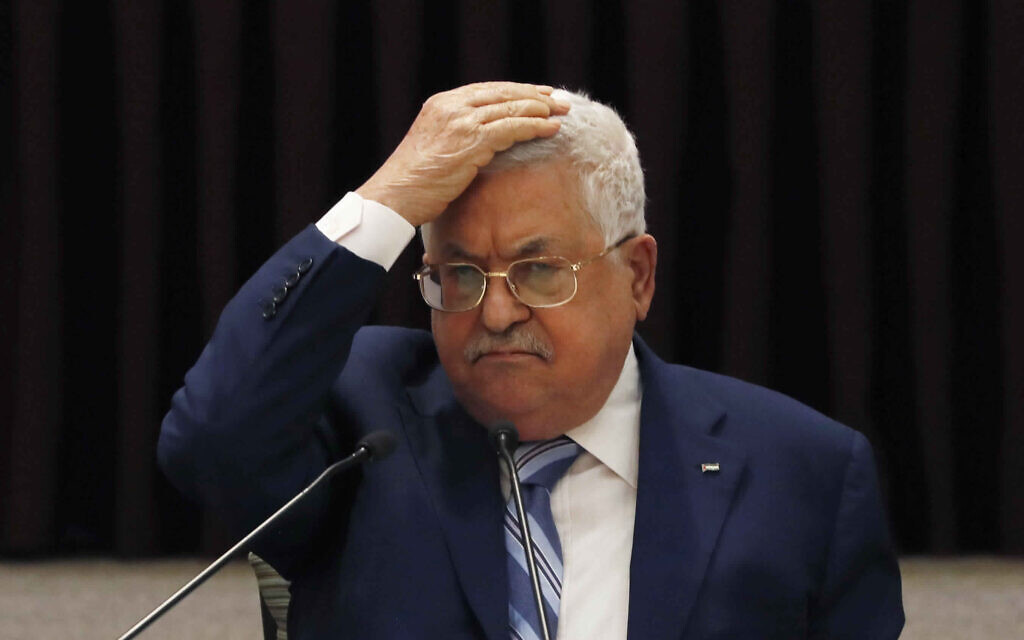Abbas may throw a tantrum, but it’s not time for a Palestinian state
It would be dangerous for Israel—an indefensible border being the main reason—but bad for America, too.
By Stephen M. Flatow
JNS
Apr 22, 2024

There he was, the Palestinian Authority’s Mahmoud Abbas, lying on the floor kicking his feet in anger over the U.S. veto of a resolution for Palestinian statehood at the U.N. Security Council. Of course, I am exaggerating about the 88-year-old on the floor, but his reaction to the American veto was not too far from a 2-year-old’s tantrum.
Notwithstanding that the Biden administration pressed Abbas not to go ahead with the bid for statehood, the administration’s veto must have come as somewhat of a shock to the Palestinians because, after all, it was U.S. President Joe Biden’s and Secretary of State Antony Blinken’s talk about establishing a Palestinian state as part of the planning for the “day after” Israel vanquishes Hamas in Gaza.
In the aftermath of the vote, Abbas told the official Palestinian Wafa news agency that “the hostile [U.S.] positions” … “have generated unprecedented anger among the Palestinian people and the region’s populations, potentially pushing the region towards further instability, chaos and terrorism.” As if he wasn’t angry enough, he threatened: “The Palestinian leadership will reconsider bilateral relations with the United States to ensure the protection of our people’s interests, our cause and our rights.”
Trying to soften the blow, U.S. deputy ambassador Robert Wood told the U.N. Security Council that the veto “does not reflect opposition to Palestinian statehood but instead is an acknowledgment that it will only come from direct negotiations between the parties” and that there are “unresolved questions” on whether Palestine meets the criteria to be considered a state.
The creation of a Palestinian state now would be dangerous for Israel—an indefensible border being the main reason—but also bad for the United States for several reasons.
• Fomenting instability. The Palestinians have a long record of fomenting regional instability. In 1970, they provoked an armed conflict with King Hussein of Jordan that resulted in the deaths of thousands. They instigated a civil war in Lebanon that resulted in the deaths of thousands. It’s only a matter of time before a Palestinian state would stir up turmoil and mayhem throughout the region. That kind of chaos in such a sensitive part of the world is the last thing that America needs.
• Proxy for rogue states. The Palestinians have always allied themselves with the most extreme and aggressive regimes in the world. In the old days, it was the Soviet Union; today, it’s Iran, China, Putin’s Russia and North Korea. How long before a state of “Palestine” invites Iranian “volunteers,” and obtains Iranian and North Korean missiles and drones? It would become a proxy state for the world’s worst rogue regimes. How would an Iranian, Chinese or Russian port in Gaza be good for America?
• Against American values. For almost three decades, we have seen what kind of state it would be from the P.A.’s practices. Islam will be the state religion. Elections will be held rarely, if ever. (Mahmoud Abbas is in the 19th year of a four-year term of office.) Critics of the regime will be suppressed. Labor unions will be harassed. Prisoners will be tortured. Christians will be intimidated. Women will be second-class citizens. The Islamist and authoritarian values embodied by the Palestinian state will be the exact opposite of the democratic and pluralistic values that we Americans cherish.
• Enemy of America. A Palestinian state would be an actively anti-American state in word and deed. How do we know? Just look at what the P.A. has been teaching its people—and especially, its children—for the past three decades. Its media and schools portray the United States as racist, colonial and war-mongering. They accuse the United States of carrying out the 9/11 attacks, spreading disease and immorality, and conspiring against Islam.
A Palestinian state will promote hatred of America, vote against the United States in international forums and align itself with radical Third World regimes. The world already has plenty of America-hating countries. Why do we need yet another?
One of the more remarkable things about the P.A.’s behavior has been its habit of taking $500 million from the United States every year, and then turning around and paying salaries and pensions to terrorists in Israeli prisons and their families, as well as naming streets, parks, schools and sports competitions after terrorists who have murdered Americans. If this is how the P.A. acts now, when it desperately needs U.S. support for its statehood campaign, just imagine how it will act when it has a sovereign state and no longer needs such aid.
• Undermining America’s ally. Israel has always been America’s closest friend and most reliable ally. As a matter of principle, and as a matter of strategic wisdom, the United States should always stand by its friends. To set up a Palestinian state along Israel’s borders would pose a grave danger to our ally. It would also undermine the confidence of all of America’s allies and call into doubt the value of its promises.
• Dragging America into overseas conflicts. Israel is certainly grateful for U.S. moral and logistical support since Oct. 7 but will never ask the United States to put American soldiers’ boots on the ground. But if a weakened, shrunken Israel would be in danger of being overrun by a Palestinian-Iranian-Chinese-Russian-North Korean onslaught, causing tremendous pressure on the United States to take direct military action rather than see its closest ally destroyed. Thus, Washington could find itself dragged into an overseas conflict that was entirely preventable.
The U.S. veto of statehood was a good thing. In every conceivable way, a Palestinian state would be bad for America—bad for American values, bad for American interests and bad for America’s allies.
No comments:
Post a Comment